Eating Disorders and Suicidal Thoughts During COVID-19

Trigger warning: this post involves frank discussion of how eating disorders and suicidal thoughts are often connected.
While these past several months of social distancing have been necessary to help contain the global pandemic, this continued isolation can adversely impact mental health. That is true for conditions across the mental illness spectrum, but I am particularly concerned about eating disorders and suicidal thoughts in the climate of COVID-19.
Since eating disorders often manifest alongside issues like anxiety, depression, trauma, substance abuse, obsessive-compulsive disorder, and self-harm, the pain of this comorbidity can result in suicidal thoughts or actions. In fact, the death by suicide rate is higher in those with eating disorders than in other populations1. Moreover, with the extra pandemic-related stress, I fear this link between eating disorders and suicidal thoughts will increase in the climate of COVID-19.
COVID-19 Has Contributed to Eating Disorders and Suicidal Thoughts
As a joint study from researchers in the United States and the Netherlands has found, during this pandemic, those with anorexia are more likely to restrict their food, while those with bulimia report elevated binge-purge cycles. In addition, those with eating disorder histories are afraid they might relapse in the COVID-19 climate, and with reduced access to in-person treatment avenues or support networks, a reliance on eating disorder behaviors could be all the more exacerbated2.
This research also confirms that a loss of structured routine, intensified loneliness or uncertainty, and social media over-consumption can lead many eating disorder sufferers to experience suicidal thoughts as well. In order to heal from eating disorders and suicidal thoughts, interpersonal accountability and therapeutic intervention are crucial, but neither is readily accessible in the midst of a pandemic—and that is the dangerous reality countless people are faced with right now.
Recovery Is Possible for Eating Disorders and Suicidal Thoughts
For those who deal with eating disorders and suicidal thoughts, this painful combination can leave them feeling anxious, desperate, worthless, broken, irrational, hopeless, overwhelmed, and burdensome to others. They might think of suicide as the only escape from all those chaotic emotions or harmful behaviors which seem to control each aspect of their lives. Eating disorders and suicidal thoughts can feel especially insurmountable to overcome in the climate of COVID-19, but healing is within reach.
As difficult as the pandemic has been, I continue to prioritize my own eating disorder recovery in the midst of it, even if that requires me to become more creative with how I seek accountability. This means communicating with my support network on FaceTime and Marco Polo, scheduling virtual therapy sessions on Zoom, journaling with vulnerability if an insecure or erroneous belief creeps into my brain, practicing self-care to nourish both my mind and body, and forming a routine to ensure I stay purposeful. Eating disorders and suicidal thoughts are serious mental health issues in the climate of COVID-19, but recovery is possible—I know this to be true.
If you feel that you might hurt yourself or someone else, call 9-1-1 immediately.
For more information on suicide, see our suicide information, resources, and support section. For additional mental health help, please see our mental health hotline numbers and referral information section.
Sources
- National Eating Disorders Collaboration, Comorbidity. Accessed September 9, 2020.
- Termorshuizen, J., et al, "Early Impact of COVID-19 on Individuals with Eating Disorders," MedRxiv.org. June 8, 2020.
APA Reference
Schurrer, M.
(2020, September 10). Eating Disorders and Suicidal Thoughts During COVID-19, HealthyPlace. Retrieved
on 2026, February 25 from https://www.healthyplace.com/blogs/survivinged/2020/9/eating-disorders-and-suicidal-thoughts-during-covid-19
Author: Mary-Elizabeth Schurrer
I know that for many this is a topic that will be very close to their heart and for others, they may be completely unfamiliar or unaware of the connection. It is conversations like these that are so important to have for that very reason. Thank you for sharing your knowledge and insight.
Hi Lizanne, thank you for the thoughtful comment and feedback! I completely agree that we need to continue talking about the connection between eating disorders and suicidal thoughts, both to raise awareness and to point toward healing.